So Many Choices, So Little Time…
When one radio season ends, another begins. That’s how swiftly things move about in the fast-paced world of grand opera… I’m kidding, of course. Typically, there’s nothing slower than grand opera, especially those grandiose efforts by Wagner and sometimes by Strauss. Verdi tends to glide along at a fairly rapid clip, with Puccini even quicker. For the most part, verismo composers take a brisk view of their work, whereas the French savor over their output (and their ubiquitous ballet sequences).
But I do digress. This latest post will pay homage to the coming Metropolitan Opera radio broadcast season, scheduled to begin in early December 2015. The Met’s official gala opening night, however, gets underway three months before that, on September 21 (broadcast via satellite on SiriusXM radio), with a new production of Verdi’s Otello, to be heard later in the season on April 23, 2016. More about that venture when we come to it!
Soon after the close of the 2014-2015 season the Met’s management informed radio listeners that one of the show’s senior producers, Mary Jo Heath, had officially taken over the duties of announcer and host from the late Margaret Juntwait. Ms. Juntwait passed away on June 3rd of ovarian cancer, a tragic blow to long-time listeners who had grown accustomed to her on-air presence as only the third announcer in Met Opera broadcast history, and the first woman to assume the role.
A native of Norman, Oklahoma, Ms. Heath earned a Ph.D. in music theory from the Eastman School of Music in Rochester, New York, as well as Bachelor and Master’s degrees in music from the University of Oklahoma. Ira Siff, the late Ms. Juntwait’s co-host for the series, will remain on board to add “color” commentary to the proceedings. A wise decision! Siff’s gushing delivery and intimate knowledge of the art form, in addition to his affable repartee with and respect for colleagues, are most welcome. I wish the team well in their joint assignment!
With the preliminaries out of the way, let’s get the opera show on the road!
We’ve already mentioned that the broadcast season kicks off on December 5th. The opening work on the program is that perennial favorite of the holiday season, La Bohème. It will star soprano Barbara Frittoli as the tubercular Mimì, Ramón Vargas as her poet-lover Rodolfo, Ana María Martínez as the flirtatious Musetta, and Levente Molnar as the painter Marcello, with Alexey Lavrov as Schaunard, Christian van Horn as Colline, and John Del Carlo as Benoit/Alcindoro. Conducted by Paolo Carignani in the iconic Franco Zeffirelli production (which has been filmed on several occasions, but with different casts), Puccini’s classic tale of young love was based, in part, on the composer’s own experiences as a struggling artist.
December 12 will bring us Verdi’s Rigoletto in Michael Mayer’s glitzy Las Vegas-style adaptation. Starring Željko Lučić as Rigoletto, Nadine Sierra as his daughter Gilda, Piotr Beczala as the lascivious Duke of Mantua (a Frank Sinatra wannabe in this production), Nancy Fabiola Herrera as the hooker Maddalena, and Dimitry Ivashchenko as the hit-man Sparafucile, it will be led by Roberto Abbado. I thoroughly enjoyed this version of the opera, which is similar, in many respects, to an earlier production by Jonathan Miller (from the 1980s) that set the story in New York’s mob-controlled Little Italy.
Moving on to the bel canto realm, the December 19 broadcast reintroduces audiences to Rossini’s La Donna del Lago (“The Lady of the Lake”) in a production by Paul Curran, with Joyce DiDonato as Elena, Daniela Barcellona in the trouser role of Malcolm, the spectacular Lawrence Brownlee as Giacomo V, John Osborn as Rodrigo, and Oren Gradus as Duglas. The conductor is Michele Mariotti. The opera is based on a romantic poem by Sir Walter Scott, the same author who fired Donzietti’s imagination with Lucia di Lammermoor. It’s a 16th-century tale of knights and damsels in distress set in the Scottish highlands. The difference is: everyone warbles in Italian! Mamma mia!
What better post-Christmas present than a December 26 broadcast of Rossini’s infectious The Barber of Seville, produced by Bartlett Sher and given in J.D. McClatchy’s English translation. Anthony Walker is on the podium, with Elliot Madore as Figaro, Taylor Stayton as Count Almaviva, Isabel Leonard as Rosina (one of her most in-demand parts), Valeriano Lanchas as Dr. Bartolo, and Robert Pomakov as Don Basilio. I am not especially enamored of this adaptation, but the sets and costumes are a feast for the eyes, and the singing is on a generally high level. It’s something to look forward to on a cold, chilly Saturday afternoon, which should warm the cockles of one’s heart.
Should Auld Acquaintance Be Forgot
The New Year rings out in true January 2nd fashion with Johann Strauss Jr.’s effervescent Die Fledermaus, also sung in an English translation. The producers are Jeremy Sams and Robert Jones. With Met musical director James Levine at the helm, this performance should be nothing less than a rousing affair! It stars Susanna Phillips as Rosalinde and Adele Crowe as Adele. One of our favorite singers (and a delightful intermission host), mezzo-soprano Susan Graham, will take on the part of Prince Orlofsky, with Toby Spence as Eisenstein, Dimitri Pittas as Alfred the rambunctious Italian tenor, Paulo Szot as Dr. Falke, and Alan Opie as Frank. In my initial review of this production, I too found the English version a trifle forced and anachronistic. But it got the requisite laughs, so who am I to argue?
The most highly-anticipated production of the new season, however, involves the Met’s first-ever presentation of Donizetti’s Tudor Trilogy. That’s quite a major undertaking, but a long-delayed one in my view. The now-defunct New York City Opera had previously staged the three works way back in the 1960s and 1970s for their erstwhile singing sensation, the lively coloratura Beverly Sills. It’s a shame the Met never got around to giving Ms. Sills a better chance to shine in one of her bel canto specialties (barring the misconceived L’Assedio di Corinto by Rossini). Still, better late than never!
The trilogy starts the ball (or heads) rolling with David McVicar’s version of Anna Bolena on January 9, headed by the ravishing Sondra Radvanovsky as Anne Boleyn, mezzo Jamie Barton (winner of the 2015 Richard Tucker Award) replacing the previously announced Elīna Garanča as her rival Jane Seymour, Tamara Mumford as Smeaton, Stephen Costello as Lord Percy, and Ildar Abdrazakov as Henry VIII. Marco Armiliato conducts. I found this production mostly drab in setting, but the colorful costumes by Jenny Tiramani and the choral work under Donald Palumbo are truly exceptional. In any case, the glamour and glitz should come from the singing. This was the case when the legendary prima donna Maria Callas revived the work in the now-famous 1957 Luchino Visconti production at La Scala.
Talk about glitz, the January 16 broadcast unveils a new production of Bizet’s Les Pêcheurs de Perles (“The Pearl Fishers”), not heard at the Met in many, many generations. This stunningly beautiful piece, which has lately received a plethora of revivals domestically, was termed by Francis Robinson, one of the Old Met stalwarts from radio days gone by, as the most requested of productions. Mr. Robinson’s reasoning for why the company hadn’t staged the work in, oh, 100 years or so was that all of its best tunes are heard in Act I. How absurd! Bizet never wrote a catchier score (his final opus, Carmen, on which his fame now rests, came over a dozen years later). With that said, soprano Diana Damrau sings the part of Leila, with Matthew Polenzani as Nadir, Mariusz Kwiecien as Zurga, and Nicolas Testé (Damrau’s real-life husband) as Nourabad. Gianandrea Noseda mounts the podium for this one. The production is by Penny Woolcock, with sets by Dick Bird and costumes by Kevin Pollard.
Next up, we have the January 23 broadcast of Wagner’s Tannhäuser, presided over by maestro James Levine, a renowned interpreter of the German master’s oeuvre. As you can see, the breadth and variety of opera on this coming season’s slate take in many neglected bel canto and modern masterworks — some more tuneful and/or respected than others — while those of Wagner have taken an unfortunate backseat. Why is that? Simply put, the singers most capable of breathing life into these demanding parts are few and far between.
However, the cast announced for this overdue revival of the Otto Schenk/Günther Schneider-Siemssen production is something to look forward to. Johan Botha, whose girth is almost as large as his voluminous voice, takes up the challenge of the title role (he was an excellent Walther von Stolzing in Die Meistersinger, so that is some comfort). He’s joined by blonde bombshell Eva-Maria Westbroek as Elisabeth, Michelle De Young as the goddess Venus, Peter Mattei (his Amfortas in Parsifal was achingly moving) as Wolfram, and Günther Groissböck as the Langrave Hermann.
On January 30, Puccini’s final statement on the subject of opera, the lavishly conceived Turandot, is heard in the famously lavish Franco Zeffirelli production. Paolo Carignani conducts, with the laser-like tones of Nina Stemme as the icy Princess Turandot, beefy Italian tenor Marco Berti as the unknown Prince Calàf, Anita Hartig as the tender Liù, and Alexander Tsymbalyuk as the deposed Timur. Signor Zeffirelli is credited as both producer and set designer.
I’ve always wondered why the Met, of all places, has yet to present Turandot in either the original Franco Alfano-penned ending (with its additional high notes for tenor and soprano) or in the late Luciano Berio’s truer, albeit eerily dissimilar appendage. As opera-lovers are aware, Puccini died before he could complete his magnum opus. Leaving behind mere sketches, among which was a cryptic scrawl in his all-but unreadable handwriting of the words “poi Tristano” (“after Tristan”), Puccini expired never having seen his work performed. At the 1926 La Scala premiere, Arturo Toscanini laid down his baton at the point where Liù’s body is carried away by the populace. The next night’s performance included Alfano’s ending, as amended by the conductor. I once heard this original, unexpurgated ending in a late-1980s production at New York City Opera. It did not sound like Puccini at all, but it was fuller and more exciting than the truncated one we’ve been hearing. Let’s give it a shot, Mr. Gelb!
It’s Going to Be a Doozy!
Turning now to two jewels in the verismo crown, the double bill of Mascagni’s Cavalleria Rusticana and Leoncavallo’s Pagliacci (in David McVicar’s recent mounting) will return on February 6, with the Met’s principal conductor Fabio Luisi once more leading the orchestra for both works. Cavalleria will star Violeta Urmana as Santuzza, with the sensational Korean tenor Yonghoon Lee as Turiddu, and Ambrogio Maestri as Alfio. In Pagliacci we will be privileged to hear Roberto Alagna as Canio (one of his signature parts), Barbara Frittoli as Nedda, George Gagnidze as Tonio, and Alexey Lavrov as Silvio. I reviewed this production a few short weeks ago. At the time, I felt that, while it paid tribute to the verismo legacy in part, it was far from ideal. Given McVicar’s track record both at the Met and abroad, I remain hopeful he will be fine-tuning the production for the better.
February 13 is “make room for Verdi” day, with David McVicar’s Goya-inspired rendition of Il Trovatore, one of the Italian master’s darkest, most melodious early works. Marco Armiliato is back on the podium for this performance, with the marvelous Angela Meade as Leonora, Dolora Zajick in her signature role as the gypsy Azucena, Marcello Giordani as the troubadour Manrico (watch out for those high C’s!), stalwart Dmitri Hvorostovsky as Count Di Luna, and Kwangchul Youn as Ferrando.
In late June, Opera News and other major publications announced the sad news that Siberian-born baritone Hvorostovsky had cancelled his performances through the summer of 2015 for treatment of a brain tumor. According to published reports, while his voice and vocal condition remain unimpaired, Dmitri’s “sense of balance has been severely affected.” We are indeed confident that this remarkable artist, whose main focus has been the Russian and Italian repertoire (in particular, the Verdi canon), will make a full and speedy recovery. Mr. Hvorostovsky was last season’s major highlight, what with that burnished voice and virile stage presence of his.
Round two of the Donizetti Tudor Trilogy continues on February 20 with the broadcast of Maria Stuarda (“Mary Stuart”), in a repeat of David McVicar’s production. The sets and costumes are by John Macfarlane. We will once again be graced by the presence of Sondra Radvanovsky as Maria (or Mary Stuart). Elsa van den Heever will also be repeating her veddy British, very Bette Davis-like interpretation of Queen Elizabeth, along with Spanish tenor Celso Albelo as Leicester, Patrick Carfizzi as Cecil, and Kwangchul Youn as Talbot. Conducted by Roberto Frizza, this opera is notorious for perpetuating the myth (concocted by German playwright Friedrich Schiller) that Elizabeth I and her rival for the English throne, Mary Stuart, had actually met and traded insults with each other. This bit of creative license, while historically inaccurate, makes for thrilling theater. I can’t wait to hear Mary hurl her infamous “Vil bastarda!” (No translation necessary) at the neurotic ruler. Sparks are sure to fly!
And speaking of neurosis, February 27’s broadcast work is none other than Alban Berg’s notorious twelve-tone Lulu in another new production, this one conceived by renowned artist William Kentridge, who gave us Shostakovich’s The Nose (the opera, that is, not the organ) a few seasons back. It will be co-directed by Luc De Wit. The set designer is Sabine Theunissen, with production design by Catherine Meyburgh. Based on German playwright Frank Wedekind’s searing stage plays Earth Spirit and Pandora’s Box, and memorably enacted for the silent screen by Louise Brooks, the production stars the peerless Marlis Petersen as Lulu, Susan Graham as the gay Countess Geschwitz, Daniel Brenna as Alwa, Paul Groves as the Painter, Johan Reuter (fresh off his portrayal of Hans Sachs in last season’s Die Meistersinger) as Dr. Schön/Jack the Ripper, and Franz Grundheber as the execrable Schigolch. Conducted by James Levine, whose championing and command of this work as well as Berg’s equally harrowing Wozzeck are justly celebrated.
March comes in like a lion — on March 5th, to be exact —with a new Richard Eyre production of Puccini’s Manon Lescaut, considered to be the Italian composer’s first big international hit. With sets by Rob Howell and costumes by Fontini Dimou, this film noir variation on Puccini’s star-crossed lovers features the young and talented Kristine Opolais in the title role (with Manon as a femme fatale?), smoldering tenor Jonas Kaufmann as the Chevalier des Grieux, rising Italian baritone Massimo Cavalletti as Manon’s brother Lescaut, and Brindley Sherratt as that old lecher Geronte. Fabio Luisi leads the way to ruin for our entranced pair.
The last time Manon Lescaut was revived in 2008, it was ill-served by the unfortunate miscasting of soprano Karita Mattila. One of the Finnish artist’s few failures, the normally fastidious Mattila, an exceptionally gifted actress and performer in her own right, simply did not evoke youth and beauty. Her lover on that occasion, tenor Marcello Giordani, also had problems projecting youthful vigor. Nevertheless, the Met decided to re-cast the work with a more, shall we say, visually credible couple. By the way, both Opolais and Kaufmann have partnered in this piece on more than one occasion — most recently, at the Royal Opera House in London.
On a lighter note, the March 12 broadcast will present Otto Schenk’s 2006 staging of Donizetti’s Don Pasquale, starring that fabulously funny comic giant, bass-baritone Ambrogio Maestri, as the Don, with Eleonora Buratto as the shrewish Norina, Mexican tenor Javier Camarena, who caused a sensation in the previous season’s broadcast of Bellini’s La Sonnambula, as Ernesto, and Levente Molnar as Dr. Malatesta. Maurizio Benini conducts.
Oy vey! Prepare yourself on March 19th for more Donizetti — a rarity, I’ll have you know, for any North American opera house to include so many of his works — with a revival of Bartlett Sher and Michael Yeargan’s vibrant production of L’Elisir d’Amore (“The Elixir of Love”). With richly-detailed costumes by Catherine Zuber, the opera will star Aleksandra Kurzak as Adina, and matinee idol Vittorio Grigolo, the Met’s newest tenor heartthrob, as the clueless Nemorino, with Adam Plachetka as Belcore, and veteran scene-stealer Alessandro Corbelli as the patter-spewing quack, Dr. Dulcamara. Enrique Mazzola will be in charge of the proceedings from the pit.
Restoration Efforts
Tragedy tomorrow, comedy tonight! Mozart’s Le Nozze di Figaro, or The Marriage of Figaro, will certainly entertain you on March 26. The cast for this revival of Richard Eyre’s production from last season includes the hearty Anita Hartig as Susanna, chirpy Isabel Leonard as Cherubino, Luca Pisaroni as Count Almaviva, Mikhail Petrenko as Figaro, and Amanda Majeski as the Countess, with maestro Fabio Luisi putting the orchestra through its paces. The one thing here that caught my eye was the casting of Russian basso Petrenko as the very Italianate (or should I say Spanish) Signor Figaro. Petrenko has proven his versatility at the Met as the dignified monk Pimen in Boris Godunov and the sinister Duke Bluebeard in the recent Bluebeard’s Castle, so I’m expecting some surprises by his latest assignment.
This production is another of Eyre’s contributions (along with those of the aforementioned Messrs. McVicar and Sher) to the refurbishing project spearheaded by Met General Manager Peter Gelb. Livening up the standard repertoire has been one of Mr. Gelb’s goals, many of which have involved replacing the old Zeffirelli productions with ones espousing a fresher viewpoint. I’m glad to report that most of his efforts in this vein have been met with support and acclaim. However some of them, including a positively dreadful Tosca by the usually on-the-money Luc Bondy, gave way to derision in the press and a lukewarm audience reception.
April showers bring May flowers, so they say. And in Madama Butterfly, scheduled for an April 2nd hearing, Puccini brought us lots and lots of tears. Here is one replacement of a major repertory item, first seen and heard back in 2006, that deserves the high praise it has garnered. An outstanding example of Gelb’s vision and foresightedness for the company, this Anthony Minghella production, with its fascinating use of Bunraku puppetry and inspired Kabuki-like displays, along with superb direction and choreography by Carolyn Choa, incredible set design by Michael Levine, and dazzling costume work by Han Feng, has been wowing the opera-going public for several seasons now. This revival boasts Kristine Opolais as Cio-Cio-San, mezzo Maria Zifchak (always a welcome presence) as Suzuki, romantic lead Roberto Alagna as Lt. Pinkerton, and dependable Dwayne Croft as the sympathetic Sharpless. Karel Mark Chichon conducts. Get out your handkerchiefs, folks!
April 9 finds us back to Verdi territory, with the master’s darkly foreboding Simon Boccanegra. This version, the work of Giancarlo Del Monaco, the son of the great spinto tenor Mario Del Monaco, will star Plácido Domingo (in his faux-baritone guise) as the titular brigand-turned-doge, basso Ferruccio Furlanetto as Fiesco, and Maltese tenor Joseph Calleja as Gabriele Adorno, with James Levine presiding. Curiously, Amelia, Boccanegra’s long-lost daughter, is supposed to be announced. Let’s hope the singer assigned to this part won’t be lost for long.
I wonder, too, how long Señor Domingo will continue to cruise the baritone seas. It’s my sincere belief, expressed a few years ago in a review of his Germont characterization in La Traviata that the workaholic, over-achieving former leading man should “hang it up” as far as performing is concerned. From the reviews I’ve read of his performances of late, Mr. Domingo’s softly-modulated tones and near-inaudibility in the theater have been hampering any number of forays. It’s time for the legendary artist to call it a night and gracefully retire from the scene.
April 16 will mark the final installment of Donizetti’s Tudor Trilogy, with a new production of Roberto Devereux. Our old friend, Sir David McVicar, will be serving as both production and set designer, with costumes designed by Moritz Junge. Maurizio Benini will lead the all-star cast, which boasts powerhouse diva Sondra Radvanovsky in a recurrence of her quirky Queen Elizabeth interpretation (as a much older monarch, of course), followed by mezzo Elīna Garanča who returns to sing Sara, Matthew Polenzani as Roberto Devereux (who, you may remember from Errol Flynn’s screen appearance alongside Bette Davis, is actually Robert, Earl of Essex), and Polish baritone Mariusz Kwiecien as the Duke of Nottingham.
The Best is Yet to Come
We now come to what is, for me, the ultimate pièce-de-résistance of the Italian operatic repertoire: the April 23 broadcast of Verdi’s next-to-last masterpiece Otello, based on Shakespeare’s play. With a masterful libretto by poet and composer Arrigo Boito (whose own opera, Mefistofele, is scheduled for a Met revival a few years hence), this extraordinary piece — the musical and dramatic equivalent of being sprayed with titanic ocean currents — when rightly performed, has to be one of the most visceral experiences of any imaginable. I vividly recall a threadbare production from the early-1980s with a no-name cast in some remote Manhattan corner. While the singing left much to be desired, the sheer sound that emanated from the orchestra during the volcanic opening storm scene was thrilling beyond anything I have heard in the theater.
This is another of those Bartlett Sher productions, sight unseen for the moment but for which great things are expected; the sets are by Es Devlin, and costume design the work of Catherine Zuber. The cast is headed by Latvian-born Aleksandrs Antonenko as Otello, who has established a reputation among the cognoscenti as a dramatic tenor in the Del Monaco mold. I’ve listened to his portrayals of the bandit Ramerrez in Puccini’s La Fanciulla del West and as the Pretender Dimitri in Mussorgsky’s Boris Godunov. If I what I heard holds true, we are in for an exceptional afternoon of opera. With soprano Hibla Gerzmava singing Desdemona, Alexey Dolgov as Cassio, Serbian baritone Željko Lučić as the duplicitous Iago, and veteran James Morris as the Italian ambassador Lodovico, this promises to be an equally thrilling ride. The conductor is Hungarian-born Ádám Fischer, although opening night is slated for the dynamic Yannick Nézet-Séguin.
April 30 is a date you will not want to miss: that incredibly concentrated, psychologically probing one-act shocker Elektra by Richard Strauss, will be the featured work. Starring the sterling voiced Nina Stemme as the put upon title character this is a realization of the late Patrice Chéreau’s posthumous production which became a critical and artistic success in France and Italy. Others in the cast include Adrianne Pieczonka as Chrysothemis, Waltraud Meier as the evil Klytämnestra, Eric Owens as Orest, Burkhard Ulrich as Aegisth, and conducted by orchestral master Esa-Pekka Salonen. Chéreau’s frequent collaborator, Richard Peduzzi, is credited with the set design, along with costume designer Caroline de Vivaise and stage director Vincent Huguet. Whew! I can feel the tremors already!
The radio season ends on May 7 on an agreeable comic note, with a revival of Mozart’s The Abduction from the Seraglio, featuring soprano Albina Shagimuratova as Konstanze, the perky Kathleen Kim as Blonchen, tenor Paul Appleby as Belmonte, basso profundo Hans-Peter König as Osmin, and Matthias von Stegmann in the speaking part of the Pasha Selim. Conducted by James Levine, this is one of the few active productions to have been directed by the late John Dexter, a pioneer on the Broadway and London stage as well as in the opera house. The set and costume designer is Jocelyn Gilbert, with lighting by Gil Wechsler.
So there you have it, fans, a season rich in firsts and the last word in fullness! Will the Met’s continuing financial troubles and union demands delay the start of the new season? Will the company be able to overcome the chronic shortage of adequate covers? Stay tuned for further developments as they arrive…
Copyright © 2015 by Josmar F. Lopes

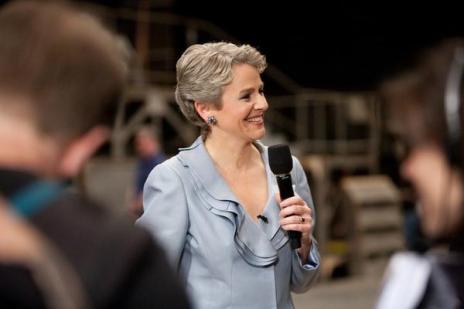
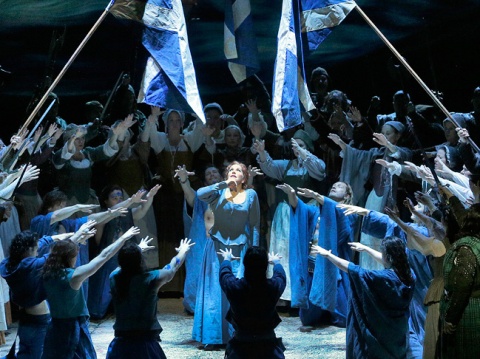
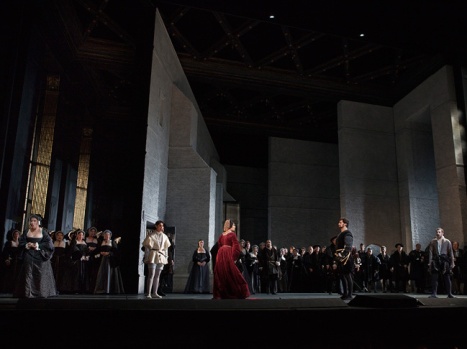
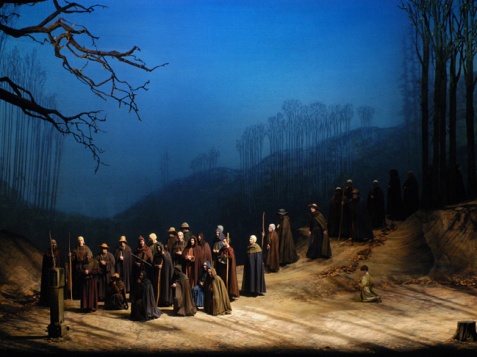
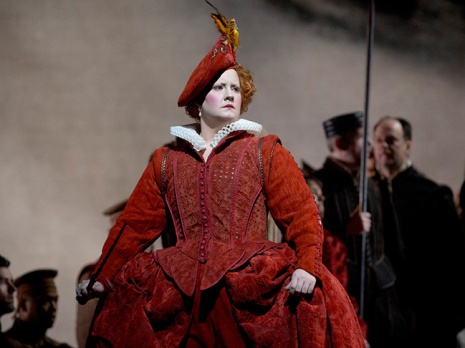
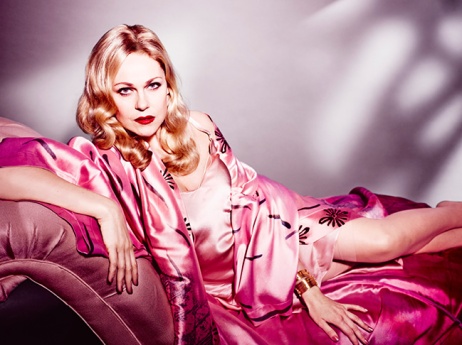
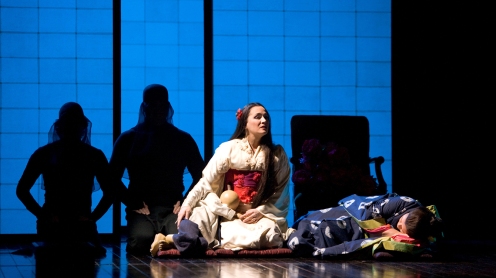


You must be logged in to post a comment.